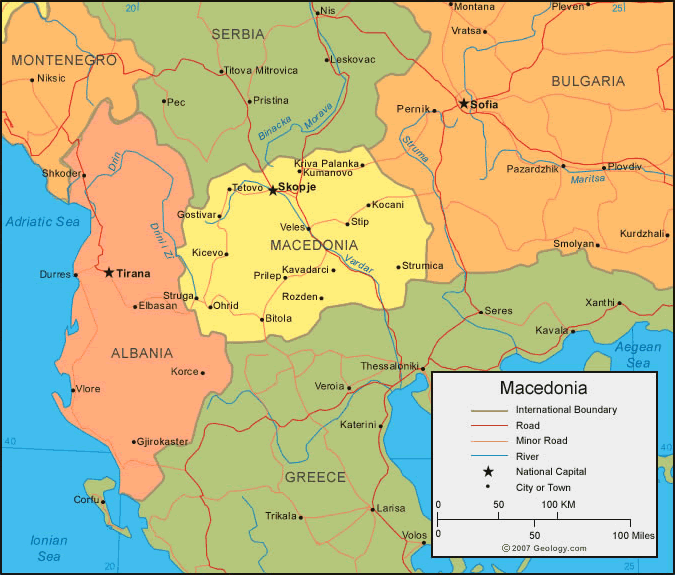The relations between Greece and FYROM (“Former Yugoslavian Republic of Macedonia”)[1] are in urgent need of improvement, after a stalemate over the name issue lasted almost fifteen years, while Macedonian bid to enter EU will be formally discussed by the EU Council within weeks, with the intention to fix a date to start integration talks in 2010.
 After few years of high tension followed the proclamation of independence by the former Yugoslavian state in 1991, under the name “Republic of Macedonia” and with a national flag representing the Greek-claimed Sun of Vergina, leading to a brief Greek blockade of its northern border, a compromise had been reached with the 1995 New York Interim Accord, which led Athens to recognize its neighbour at the condition that it dropped the symbol from its flag and cleaned up its constitution from irredentist parts prefiguring territorial claims. Since then, many attempts to find a compromise over the name have been made, although with little success, while Greece has started to increasingly invest in its northern neighbor’s economy, which now looks at Greece as its first channel of economical survival and top trade-partner.
After few years of high tension followed the proclamation of independence by the former Yugoslavian state in 1991, under the name “Republic of Macedonia” and with a national flag representing the Greek-claimed Sun of Vergina, leading to a brief Greek blockade of its northern border, a compromise had been reached with the 1995 New York Interim Accord, which led Athens to recognize its neighbour at the condition that it dropped the symbol from its flag and cleaned up its constitution from irredentist parts prefiguring territorial claims. Since then, many attempts to find a compromise over the name have been made, although with little success, while Greece has started to increasingly invest in its northern neighbor’s economy, which now looks at Greece as its first channel of economical survival and top trade-partner.
Now, the situation could finally change with the triumph of the social-democratic PASOK at the last elections. Interestingly, the new Greek Prime Minister, George Papandreou, has decided to put foreign policy under his personal control, after the negotiations for the creation of the new cabinet. Papandreou has immediately given reassuring signals on Greece’s delicate relation with Turkey (especially over the Cyprus issue), but has not addressed directly yet the problems with Skopje.
At the same time, early this month a special recommendation has been released by the EU Commission over the future of Macedonian EU accession, openly inviting the government in Skopje to find a compromise with Athens as soon as possible, in order to obtain Greek approval at the next round-talk over the future of FYROM’s integration in December. In the same way, EU special commissioner for enlargement, O. Rehn, has urged both governments to find a stable compromise before the meeting.
Rumours circulated yesterday that Gruevski’s government would be willing to accept a settlement over the name in 2010, if Greece will support a common resolution within the EU Council in the decisive meeting held in a few weeks. A settlement could be in fact reached around the provisional term “Republic of Northern Macedonia” (with the geographic term constituting a condition sine qua non for Athens), originally proposed by Matthew Nimitz, UN mediator in the negotiation over the dispute.
However, to anticipate that Macedonian population will be accepting a radical change by its government on such a delicate and heavily politicized matter could be an unforgettable mistake. Although the ruling party VMRO-DPMNE is enjoying a solid majority, polls report that the 95% of Slav Macedonians are against a compromise changing the national name, while the 65% of Albanians (composing almost the 26% of the total population) are in open favor of a settlement, which is seen by them as a precondition for EU and NATO accessions, and therefore stability. This is certainly the reason why Rehn has criticized a proposal aired in Skopje of linking the fate of a settlement with Greece to a popular referendum.
The hope is that the centre-rightist VMRO-dominated government will succeed in imposing domestically a compromise to be urgently found with the new socialist government in Athens, less willing to engage in the same kind of inconclusive talks led by former Greek Foreign Minister, Bakoyannis, and firmly believing in the necessity to guarantee stability on Greece’s northern flank. What is at stake, it’s not merely the accession of Skopje to the EU, or to the NATO, but the internal stability of the Macedonian Republic itself, which could ultimately endanger the remarkable stability of the Okhrid Agreement, signed in 2001, reopening the hostility with the Albanians. Ultimately, it’s from the survival of the inter-ethnic institutional compromise in Macedonia that the regional stability in Southern Balkans depends.
[1] The Author makes use of the names “Macedonia” or “FYROM” without any particular political implication.

Leave Your Comments